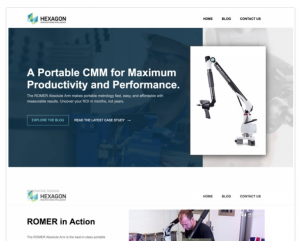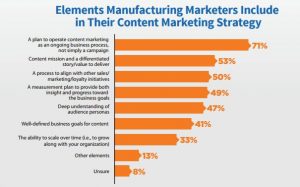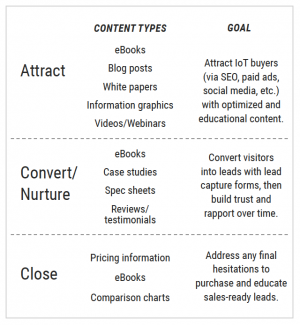
For industrial companies trying to break into a digital market, there are plenty of opportunities for your manufacturing marketing strategy: lead generation, customer conversion, and brand awareness. However:
According to the CMI, only 1% of manufacturing marketing teams rate their marketing as "sophisticated."
Whether you agree with this statement or not, there is clearly room for marketers to grow in their content marketing, campaigns, and website strategy. Here is top advice for manufacturing marketers who want to grow their presence (and business) online.
 A strong manufacturing website should host thought leadership content, generate leads, and rank in organic search for key terms. However, without a great website design, you won't have the foundation to meet your goals.
A strong manufacturing website should host thought leadership content, generate leads, and rank in organic search for key terms. However, without a great website design, you won't have the foundation to meet your goals.
Find a manufacturing marketing company to partner with you on a website redesign, if you don't have in-house capabilities.
Specifically, you'll need a website that:
You might know that many industrial companies are working content into their manufacturing marketing strategy.
In fact, 85% of manufacturing marketers are currently using content marketing, according to CMI.
 Content can serve several roles for your sales funnel:
Content can serve several roles for your sales funnel:
You might be wondering, how can content achieve all that? By producing content marketing throughout the sales funnel, you can achieve major business goals.
First, you'll need to buildup an organic presence — that is, "authority" in Google that allows you to rank for manufacturing- and product-related keywords. Blog regularly (1-2x a week) on topics of interest to your buyers. However, avoid the urge to write about product- or company-centric news and information.
 Content offers can help you throughout the entire sales funnel, especially when targeting specific stakeholders in the sales process.
Content offers can help you throughout the entire sales funnel, especially when targeting specific stakeholders in the sales process.
Then, go a step farther by creating gated content offers, such as case studies and white papers. These should go into more depth about your solutions, but first and foremost, these must service your audience. By "gating" this content behind landing pages, you will start generating leads who provide their contact information.
Finally, work with your sales team to develop content to assist through the sales process. Maybe there are common hesitations to buying. Or maybe many prospects request a spec sheet, case studies, or something else. These requests can all be made into content offers, which are sent on a one-to-one basis by sales reps.
When many companies decide to promote their website (especially within the manufacturing industry), they "spray and pray" — that is, send out a promotional message to a wide and un-targeted audience. However, you will drive more qualified leads online if you can target your campaigns.
Specifically, you should invest in these promotional channels as an addition to your organic search efforts:
No marketing strategy is complete without testing and iteration. Don't create all of these assets, then "set it and forget it." Instead, it's crucial that you iterate weekly or even daily. That is, use analytics tools like HubSpot, Google Analytics, Hotjar, and SEMrush to track your keywords and page performance.
By staying close to the performance of your website — and knowing how many leads you're generating from different content offers and campaigns — you will pave a neat, clear pathway to do more of the successful stuff.

CMI. https://www.globalspec.com/advertising/trends-wp/2017_ContentMarketing_CMI.
by Jonathan Franchell, CEO of Ironpaper - For more tips and hacks: Need to remove a new line after h1 tags? Both web designers and SEO practitioners need to employ headline tags: H1, H2, H3 in several ways to improve web page structure and tag...

The Crowded Arena of the IT Marketplace Updated December 2024 The Information Technology (IT) landscape is experiencing rapid growth and intensifying competition. IT spending is projected to reach nearly 5.1 trillion U.S. dollars in 2024, a...

Updated December, 2024 The field of digital marketing is evolving rapidly in response to new technology and changing buyer expectations. To help career-minded marketers, we’ve rounded up the top 10 skills needed to succeed in the field. These are...

The marketing industry is transforming significantly due to generative AI and increasing market complexity. Gartner's prediction of a 25% decline in traditional search traffic suggests that the era of search engines is dying. AI tools, particularly...
